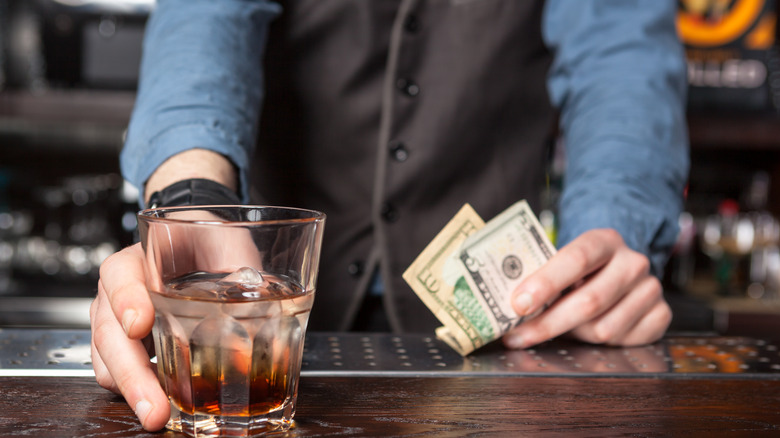How Much Money Do Bartenders Typically Make?
Bartenders rely on a host of diverse skills to please their patrons. Having vast knowledge of alcohols, mixers, and garnishes, and how to mix them together to make a great cocktail, is certainly important. But being quick, clean, and having exceptional customer service skills, are critical to a bartender's paycheck, as well as to the success of the establishment. From the social aspect of getting to know the customers to the technicalities of concocting beverages, establishments rely on bartenders to handle a number of key responsibilities.
Whether the importance of these duties is reflected in their earnings varies based on a number of situational factors. Indeed reports that the national average hourly rate for bartenders as of February 2022 is $14.04, plus about $150 in tips per shift. But that's not consistent across the board.
Determining the average income of a bartender can be nearly impossible because the answer varies based on a number of considerations. According to Binwise, you can find varied bartender salaries reported by different websites. On the higher end, you'll notice an average of $32,840 annually while on the lower end, around $21,230. But do these numbers really reflect how much a bartender can earn?
Bartenders can make more money at different locations
No hard rule exists when it comes to how much money bartenders can make. Their income depends largely on the type of venue in which they are employed, geographic location, and the volume of customers they serve from day to day (per Crafty Bartending).
For example, Indeed reports that New York bartenders earn an average of $17.41 per hour, but in Orlando, Florida, they earn $12.64. The East Coast, as well as some of the Northeastern States, are homes to the highest hourly wages, but California's bartenders earn 7% more than the national average. Factors for the difference in salaries may include job growth in the respective areas, tourist attractions, competition, and cost of living.
Another big determinant in how much a bartender gets tipped is the day of the week. On weekdays, bartenders may make less than they would on a busy Friday or Saturday night. The time of day also matters, as well as the type of establishment. In 2020, bartenders working in hotels and restaurants were paid the most hourly, while civic and social organizations were paid the least (per The U.S. Bureau of Labor Statistics).
Bartending License Help reports that on average, given all the considerations, bartenders make between $35,000 and $40,000 per year, but notes that with a bit of focus and hustle, that number can increase to up to $70,000.
An experienced bartender makes more money
Indeed reports that experience matters when determining how much bartenders make. The outlet shares that bartenders with one or two years of experience see an average earning of $12.98 per hour, yet those with three to five years of experience average $14.78 per hour. Bartenders with more than 10 years of experience average even higher at $16.15 an hour.
Seasoned bartenders can earn more money because they have the ability to serve a higher volume of customers and ensure a positive experience (per Crafty Bartending). Veterans of the industry might also earn more tips because they exude confidence behind the bar, make fewer mistakes, and have the necessary skills and knowledge to handle difficult drink orders. Some customers look to the bartender for advice on what wine to pair with a meal or what alcohol is best straight up. Those who can offer an acceptable answer will generally have a more satisfied customer.
Vinepair indicates that expert bartenders display extraordinary cleanliness, multitasking abilities, a knack for managing multiple customers, and exceptional hospitality skills. All of these components culminate in a tip, which, typically, reflects the customer's experience. Tips can account for 75-85% of bartender earnings, so mixologists have a good reason to work hard, stay up to date on the trending cocktails, and to take their job seriously.
Alternative ways bartenders can make money
Experienced bartenders looking to step out of the traditional hospitality industry have several alternatives for earning extra cash. Party Shakers Bartending Services explains that freelance bartenders can make from $40-$80 per hour working privately catered events. A few hours of service can add up to several hundred dollars and result in repeat clients and word-of-mouth advertising and exposure.
According to Indeed, bartenders can make 32% more than the national average bartender salary working on a yacht or chartered boat, like one from the Balboa Yacht Club. On cruise ships, ZipRecruiter shows that bartenders earn around $21 per hour and $43,069 yearly. Casino bartenders make less than their counterparts on boats, averaging an annual $28,270.
Bartenders with a number of years under their belts are also qualified to act as brand sales representatives, managers, and merchandisers. For example, the average beer brand ambassadors make around $44,990 each year, but salaries have been reported as high as $73,000. Bartenders who choose to climb the ladder to become general managers have the opportunity to make, on average, around $54,699 annually (per Glassdoor).
With so many determining factors, it may be impossible to put a number on how much a bartender should make, but for the same reasons, it appears the sky's the limit on how much the crafty mixologists could make.



